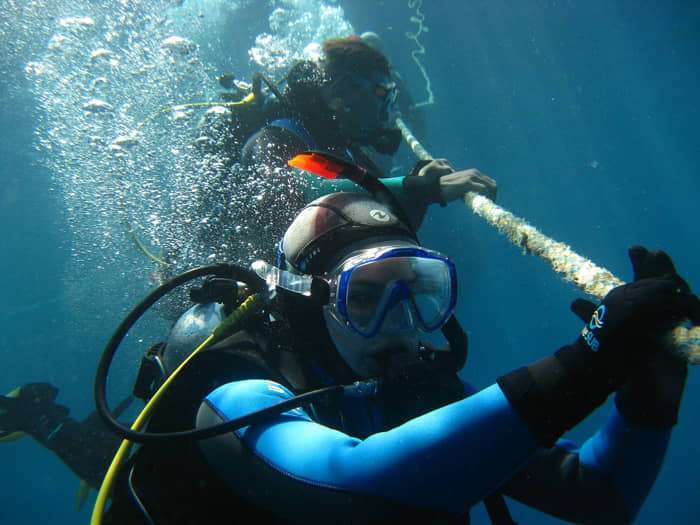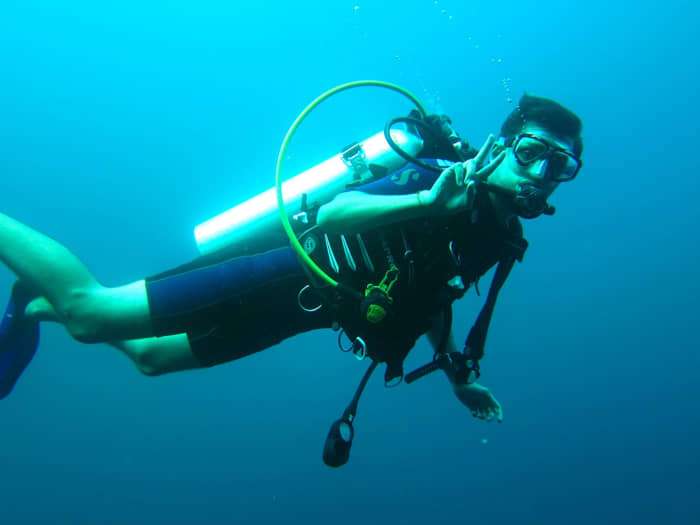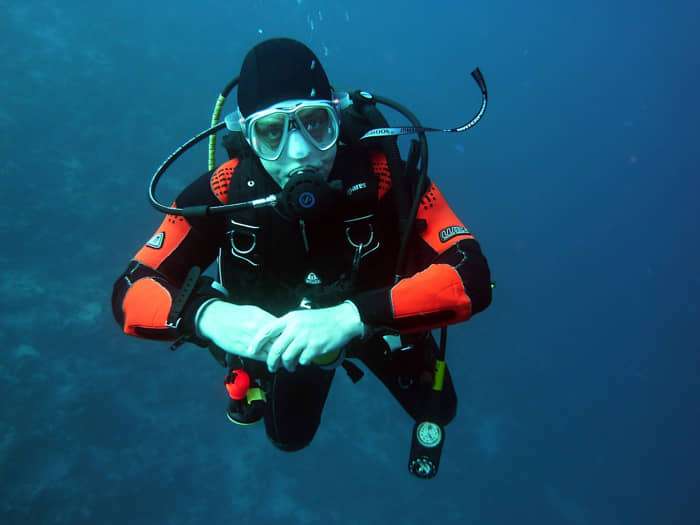Diving is a safe activity. That’s the starting point. However, taking the necessary precautions is essential to enjoy the experience without any issues. Education plays a critical role in achieving this. That’s why all divers must complete the Open Water course for beginners and more advanced courses for those who want to deepen their passion for the underwater world. And of course, diving should always be guided by certified professionals who prioritize safety.
Today, we’ll discuss a potential inconvenience that can occur after diving: dizziness. We’ll go over the most common causes, predominant symptoms, and tips to prevent it.
Contents
Causes of dizziness after diving

Have you taken off your fins only to feel like the world is spinning? You’re not alone! Dizziness after diving is common and, while annoying, has clear explanations. Here are some of the main causes:
- Pressure differences: during ascent, changes in pressure can affect the inner ear, which is crucial for balance. This phenomenon is known as barotrauma.
- Water movement: diving in currents or choppy waters can confuse your brain, creating a sensation similar to seasickness—like you’re still in the water even after you’ve surfaced.
- Dehydration and fatigue: diving is deceptively demanding. If you’re not well-hydrated or rested, you’re more likely to feel dizzy. So, no late-night partying before your dive!
- Sensory overload: being surrounded by water, with muffled sounds and limited visibility through your mask, can create sensory disconnection. This can confuse your balance system when you resurface. Additionally, the sheer number of underwater stimuli can overwhelm you—a kind of underwater “stendhal syndrome.”
- Nitrogen exposure: excess nitrogen in the body, especially after long or deep dives, can lead to symptoms like dizziness or even vertigo. Proper dive planning is crucial to prevent this.
Dizziness after diving can manifest in various ways. Recognizing the symptoms is key to taking action quickly:
- Vertigo: the feeling that the world is spinning around you, even when you’re completely still.
- Nausea: often accompanying vertigo, this stomach discomfort can make the thought of food unappealing.
- Imbalance: a sensation of unsteadiness, as if walking on an unstable surface.
- Ear pain or pressure: this may indicate issues with pressure equalization during the dive.
- Confusion or extreme fatigue: though less common, some divers report feeling disoriented or excessively tired post-dive.
If symptoms persist or worsen, consult a doctor specializing in dive medicine. It could be something more serious, like mild decompression sickness.
How to prevent dizziness while diving

Preventing dizziness is easier than you might think with some good habits and pre-dive planning:
- Plan your dives properly: follow slow ascent rules and always perform a safety stop to allow your body to adjust to pressure changes.
- Stay hydrated before and after diving: dehydration increases the likelihood of dizziness. Drink water before gearing up and keep a bottle handy for after the dive.
- Get enough rest: a good night’s sleep ensures your body is in top condition to handle the physical demands of diving.
- Avoid heavy meals or alcohol before diving: both can contribute to nausea and dizziness.
- Master proper equalization techniques: learn how to effectively balance pressure in your ears during descents and ascents.
- Choose calm days for diving: If you’re prone to dizziness, pick days with calm seas for your dives.
Tips for recovering from dizziness
Already feeling dizzy? Don’t worry! Here are some tips to help you feel steady again:
- Sit and relax: find a stable place to sit or lie down. Keeping your eyes closed can help if you feel like the world is spinning.
- Drink fluids: replenishing lost fluids is essential to help your body rebalance.
- Have a light snack: a small sugar boost can help, but avoid heavy meals until the dizziness subsides.
- Try natural remedies: ginger is a popular remedy known for its anti-nausea properties.
- Avoid sudden movements: keep your head still and avoid abrupt motions, as they can worsen vertigo.
- Seek professional help if needed: if symptoms persist or include additional issues like breathing difficulty, don’t hesitate to consult a medical professional.








0 Comments